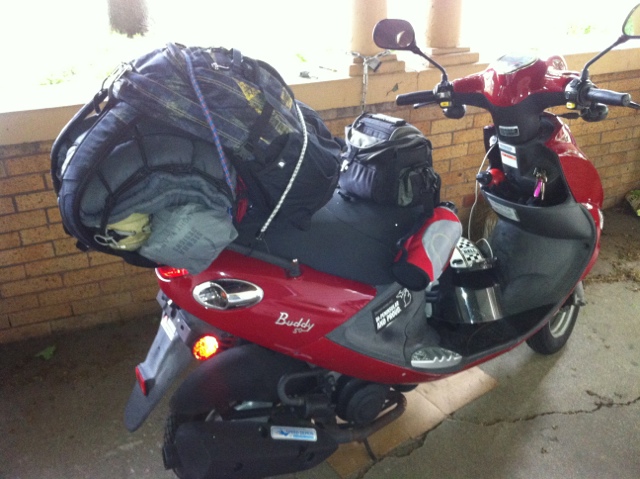So now that I have the backpack, I need to figure out how to pack it on the scooter. I tried putting it on the floor between the seat and steering column, but it was in the way and not very secure. OK for transporting a 40-pound bag of bird seed home from the store, but not for what could be a 1500-mile road trip. What I ended up with is turning it around and facing it downward, and having my tent and sleeping gear “wear” it. With a couple bungees added for stability, I think I’ve got a winning setup.
It takes up some of the seat, which means I have to sit a little forward of where I usually sit, but not much. Since most of the gar that I’d normally take in my big over-the-shoulder bag is now in the backpack, I’ve replaced that bag with a much smaller camera bag. (I’m not sure if I’ll keep the water bottle on it.) This picture does a pretty good job of showing the whole set-up: sleeping bag (olive), tent (dull green), and sleeping pad (red) on the bottom, with pillows (faded black) on top of them, secured under the bungee net; backpack on top; camera bag with water bottle on the seat; and spare gas (in the red metal bottle) and oil (not visible) in the glove bucket. Also not visible: clothes in the “pet carrier” under the seat.
I tested it with a short ride, both with and without the rain cover,in windy conditions, and it worked fine. It does mean I’ll have to remove the pack every time I refuel (or need to get anything from under the seat), however. It’s a substantially larger bundle on the back than I’ve had in the past, but not carrying the big shoulder bag does a lot to make up for that. And it’s pretty aerodynamic.
The second half of “backpack packing” is figuring out how to pack the necessary gear into my backpack, for when I’m on the trail. As you can see, the pack is pretty small. And I’ll be honest here: I misjudged this task.
On a long backpacking trip, food is the largest single item to pack. This is a short backpacking trip, so I figured I’ll save a lot of space by not carrying much food. But I still have pretty much everything else. The cooking gear is the same size, the water gear is the same size, the tent is the same size, the sleeping bag is the same size, etc. I’m bringing less clothing. But it’s still a lot of gear for such a little pack.
I’d planned from the start to strap the tent to the outside, and modified the pack to allow that. Turns out I’ll be doing the same with the sleeping bag. Normally I bring along a pair of “camp shoes” to wear instead of my hiking boots when I get to camp; there’s no place to put them. A pair of jeans for when it gets cold at night? Doesn’t look like it. To bring along just one of the two little pillows I’m packing, I need to use the bungee net. Which is also the only way I could include the (necessary) second water bottle. And the bag is packed so tightly that it doesn’t fit as comfortably as it should.
There’s very little in the pack now that could be considered “optional”. Fresh underwear? Cooking gear (so cold oatmeal and freeze-dried dinners)? The towel? Ditching the rain gear would free up a lot of space, but that’s conceivable only if the forecast is confidently precipitation-free.
I think it’ll work like this. It’s only for a couple days. And even though it doesn’t fit as well as my bigger pack would, it’s still lighter, and the terrain I’ll be hiking (especially on the first trip) isn’t particularly challenging. So it’s OK. I think.

It’s like Tetris. What are the chances you’ll lean back against for longer rides, and would that impact the stability?
If I push back against it, it just gets compacted a little more.
And for the ride back it will have less in it so looks like you have a solid plan.
Enjoying your lead-up planning posts.